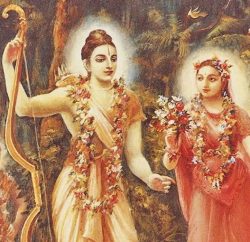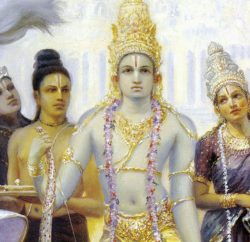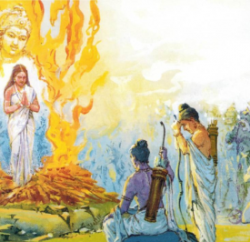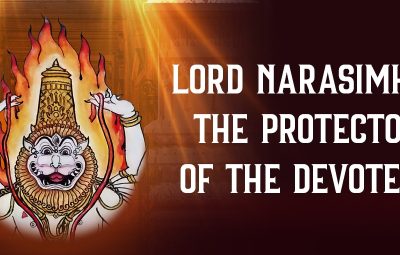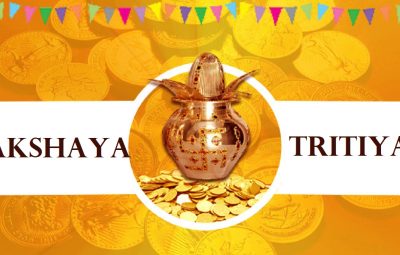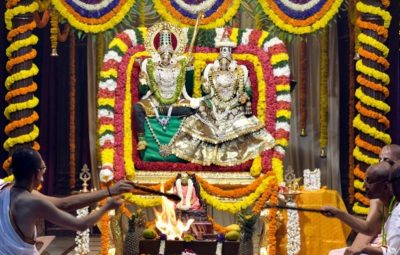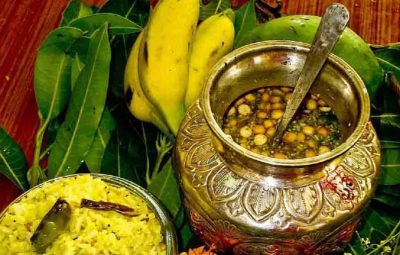Jaya Sri Ram! As we enter into the auspicious ten days of the Dasara, which will culminate in the Vijayadashami, the day of victory of Good, represented by Lord Rama over the Evil-Ravana; we bring you a series of narrations from Ramayana, describing ten transcendental qualities of Lord Ramachandra, one for every day of the Dussehra.
Please read and relish, like and share these articles, and you may also leave your comments to us.
Table of Contents
Quality 8: Lord Rāma, the exterminator of evil
As the evil forces on the planet substantially increased. The poor and good were harmed and tormented. The sages and ascetics had been treated as just food by the evil demons. The supreme personality of Godhead as Lord Rāma took birth with just one purpose, to exterminate the evil forces, once and for all.
Lord Rāma’s life was such that he crossed paths with almost all of the evil forces of that period, eradicating all of those. Neither the most powerful Tataka nor the undefeatable Khara, the mystical Maricha or the mighty Dushana could escape their final fate, by the hands of Lord Rāma.
The time had come for the King of all evil, the Demon King, Rāvaṇa. The epic of Rāmāyaṇa narrates the final battle as the Gods in wonderment watched the two belligerent opponents exhibiting their full prowess on the battlefield.
Rāvaṇa goes to war
In a hard-fought battle, Lakṣman killed the merciless and evil-minded Indrajit. The terrified Rākṣasas ran to Rāvaṇa and informed him, of his son’s fall. Then, Rāvaṇa mounted on the chariot, which shone like the sun. Following him were the forces who rushed towards Rāma’s army, sending up loud shouts.
The battlefield was strewn with the corpses of slain monkeys as Rāvaṇa ploughed into the Vānara forces, he searched for Rāma. Looking around, he saw Rāma and Lakṣman fighting in the distance. As his chariot moved across the earth shook, it gave off a sound like the rumbling of a thousand thundering clouds. 
Noticing the demon approach like a comet, Lakṣman shot innumerable arrows toward him. But the demon displayed astonishing dexterity and cut them all down. Rāvaṇa went straight past Lakṣman and approached Rāma.
He loosed a shower of arrows on Rāma which were like venomous serpents with flaming heads. Rāma immediately countered Rāvaṇa’s arrows with crescent-headed shafts and cut them to pieces.
Rāvaṇa continued to shoot arrows at Rāma, and the prince replied with equal numbers of His own.
The sky filled with arrows which resembled flocks of golden birds. As those golden arrows protruded out of Rāma’s body and one on head producing profuse blood, Rāma appeared to be wearing a shining crown decorated with a red garland.
Countless arrows swept like a sheet across the entire battlefield, killing many from either side.
Lakṣman measures Rāvaṇa
Lakṣman then came forward and challenged the demon. He shot precise arrows that cut to pieces the demon’s standard, then severed the head of Rāvaṇa’s charioteer. With five more well-aimed arrows, He broke apart the Rākṣasa’s gleaming bow.
 Rāvaṇa stunned by the ferocity, of Lakṣman’s arrows turned to face the prince. He instantly fired his infallible lance at Lakṣman which struck him on the chest and collapsing him unconscious on the ground.
Rāvaṇa stunned by the ferocity, of Lakṣman’s arrows turned to face the prince. He instantly fired his infallible lance at Lakṣman which struck him on the chest and collapsing him unconscious on the ground.
Rāma was overwhelmed with sorrow. His eyes filled with tears. As furious as the fire of universal destruction, He glared at the demon.
Asking Hanumān and Sugrīva to guard his brother, Rāma released an endless stream of ferocious shafts at Rāvaṇa. The demon fell back as Rāma closed on him.
As Rāvaṇa retreated in fear, Rāma went back to Lakṣman. Hanumān had fetched the divine herb, from the Himālayas, according to the advice of Sushena, the Vānara physician. Sushena administered them to Lakṣman. By the divine power of the herb sanjivakarani, the prince slowly returned to consciousness. Rāma was overjoyed.
Rāvaṇa’s prowess
The time for the arrogant demon’s destruction had come. From the sky, the gods observed the combat. Seeing Rāma standing upon the ground, Indra assisted Him by offering his chariot. In there was his mighty bow and other infallible weapons, as well as his invincible golden armour. Rāma happily accepted.
Rāvaṇa realized that Rāma was assisted, by his enemy Indra and was enraged. With his ten heads and massive bow, Rāvaṇa stood in his chariot, looking like the Maināka Mountain risen from the ocean and the demon overwhelmed Rāma with his arrows. So intense was Rāvaṇa’s attack that Rāma was unable to lift His bow. With blood shining on His chest, Rāma resembled a great kinshuka tree in full blossom.
The gods showered blessings on Rāma while the Daityas and Dānavas uttered benedictions upon Rāvaṇa.
As the war progressed, neither opponent could easily see the other, so was the number of arrows filling the air.
Rāma’s might
Rāma soon fired the weapons charged with the mystic power of the divine. The arrows tore into Rāvaṇa and sent him reeling.
The demon was reduced to a sorry plight, unable to lift his bow or do anything in his defence. He slowly sank on the floor of his chariot.
Witnessing this, his charioteer veered away from the fight. Gradually returning to his senses, he immediately chastised the charioteer and ordered him to return to Rāma’s presence.
Rāma saw Rāvaṇa’s chariot flying toward him. Grasping Indra’s bow, Rāma with patience awaited His opportunity to attack the demon.
Rāma and Rāvaṇa fought intensely for hours without any interruption. Exchanging blow for blow, neither felt wearied nor inclined to give an inch to the other.
The battle between Rāma and Rāvaṇa, compared to none but itself. Such a fight was never seen, at any time even by the gods.
The end of Rāvaṇa
Rāma remained calm. He fired an arrow imbued with mystic power, divided into ten and tore off the demon’s heads. But they immediately grew again.
Rāma wondered, How to kill this demon? 
Vibhīṣaṇa quickly approached Rāma and told him that the demon had a boon from Brahmā. In Rāvaṇa’s heart was a store of celestial nectar which renewed the life in his body. The only way to kill him was to strike at his heart with a divine weapon that could dry up the nectar.
Rāma remembered the celestial arrow which Agastya had given Him long ago in the forest. At once it appeared, its shaft was made up of ether, and its weight consisted of the Mandara and Meru mountains combined.
The wind-god presiding in its shaft, the fire-god in its plumes, and the sun-god installed at its point, resembling the rod of universal destruction wielded by the Time-spirit. Rāma chanted the Aditya-Hridaya prayer and then invoked the infallible brahmāstra.
It struck the demon on his chest, piercing right through his heart, as he stood firing his weapons at Rāma. Rāvaṇa swirled around and let out a cry which seemed to shake the entire creation. His bow dropped, from his hands and he fell from his chariot like a mountain struck down by Indra’s thunderbolt.
The end of Rāvaṇa ensured the end of the evil reign. Millions of evil Rakshasas had met their fate. And with it, the purificatory process of the planet was completed.


